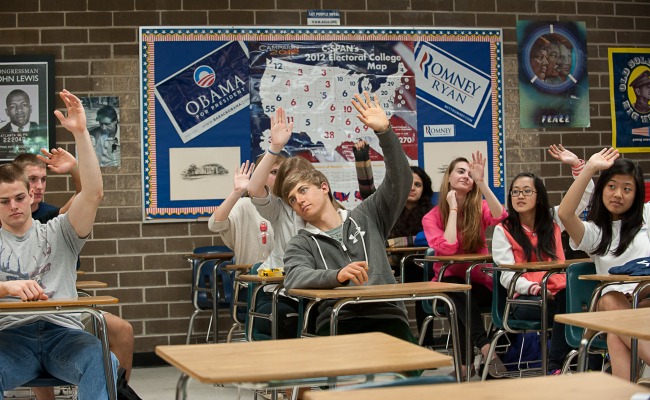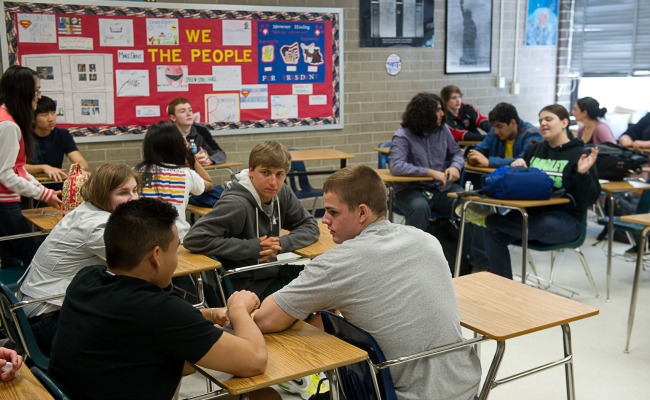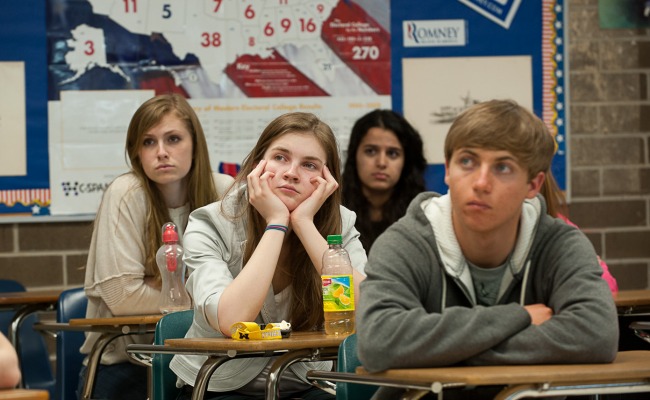The Outsiders: How Can Millennials Change Washington If They Hate It?
Young people are eager to serve and to change the world. They just have no faith that public service or elected office are the way to get it done.

Forget what you’ve read about the “Me, Me, Me Generation.” Here are four things you probably don’t know about the 95 million Americans born between 1982 and 2003:
- Millennials, in general, are fiercely committed to community service.
- They don’t see politics or government as a way to improve their communities, their country, or the world.
- So the best and brightest are rejecting public service as a career path. Just as Baby Boomers are retiring from government and politics, Washington faces a rising-generation “brain drain.”
- The only way Millennials might engage Washington is if they first radically change it.
The first three conclusions are rooted in hard data I’ll share below. For a least a decade, experts have struggled to understand why civic-minded Millennials are rejecting public service and politics. Beyond the why, I wanted to understand what it means: What happens to U.S. politics over the next two or three decades if the best and bright of the next generation abandon Washington? So I talked to them -- at elite public high schools in suburban Washington and Boston, at Harvard University’s Kennedy School for Government, and on Capitol Hill. In all, I conducted more than 80 interviews with Millennials as well as pollsters, demographers, and generational experts. They brought me to my fourth conclusion: What Millennials have in store for the political system is revolutionary. Maybe worse.
“They’ve been told all their lives to wait in line,” former Republican National Committee Chairman Michael Steele says. “But they’re of a mind to say, ‘OK, while I’m waiting in line I’ll blow your stuff up.”
You’ve heard the knocks against Millennials. They’re narcissistic, coddled, and lazy, not to mention spoiled. But there’s more to their story. The largest and most diverse generation in U.S. history is goal-orientated, respects authority and follows rules. Millennials are less ideological than their Baby Boom parents (more on that later) and far more tolerant. In addition to famously supporting gay rights, polls show they are less prone to cast negative moral judgments on interracial marriages, single women raising children, unmarried couples living together and mothers of young children working outside the home. While their parents and grandparents preferred to work alone, young Americans are team-oriented and seek collaboration. Wired to the world, they are more likely than past generations to see the globe’s problems as their own. Millennials are eager to serve the greater community through technologies, paradoxically, that empower the individual.
Speaking of technology, Millennials witnessed, embraced, and in some cases instigated massive disruptions of the music, television, movie, media, and retail industries. The most supervised and entitled generation in human history, they have no patience for inefficiency, stodgy institutions or the status quo. Consider what they could do to politics and government.
The good news is they want to serve.
“The Millennials have arrived, and they could rescue the civic health of our nation after decades of decline,” says John Bridgeland, CEO of Civic Enterprises, a national-service think tank. One of the nation’s foremost authorities on civic engagement, Bridgeland believes Millennials will be the next Greatest Generation, because, like the generation anointed by Tom Brokaw, they are products of an era of economic crisis and war, and are committed to community service.
The path to service usually goes like this: A Millennial’s parents fret that their precocious daughter can’t compete in a global economy without admission to a prestigious university. Volunteerism looks good on college applications, so twice a week they drive her to the local food pantry, where, starting in elementary school, she stocks shelves. When she gets to high school, community service is a requirement, because the superintendent’s appraisals are tied to college-admission rates.
Over time, a funny thing happens: The child actually likes community service. Data shows Millennials continue to volunteer into adulthood. Their reasons range from the practical (“It’s a great way to catch up with friends and help people,” a Concord, Massachusetts, high-school student told me) to the spiritual (“It just makes me feel better about myself,” said a 23-year-old politico at the Democratic Congressional Campaign Committee.).
The National Conference on Citizenship reported in 2009 that Millennials “lead the way in volunteering” with a 43 percent service rate, compared to only 35 percent for Baby Boomers. According to research conducted for Harvard’s Institute of Politics, more than one-third of Americans ages 18-29 report that they volunteered for community service in the last year. Among college students, the volunteerism rate is a remarkable 53 percent, of which 41 percent say they serve at least a few times a month. The IOP has found similar levels of service since the project began in 2000.
Millennials also have an outsized sense of purpose. “Young Americans are more concerned with the importance of their work than the salary attached to it,” according to a study by the Government Business Council, the research arm of The Atlantic’s sister publication Government Executive. “In the 2011 National Association of Colleges and Employers (NACE) Student Survey, college students revealed that the ability to improve the community ranks almost as highly as a strong starting salary when searching for their first job.”

But how do they hope to serve? Matt Kissling teaches government at Langley High School, an elite public school in suburban Washington that caters to the sons and daughters of U.S. congressmen, ambassadors, and Cabinet members. If his students aren’t the best and brightest, they’re close enough. So I asked them: “How many of you volunteer in your community?”
Every student raised a hand.
“I teach autistic kids to ride horses,” Morgan Wallace said.
“Me, too,” said Ashley Morabito. They’re all chirping now:
“I work at a food pantry.”
“ … at my church.”
“Tutor reading …”
“… and teach English.”
“But how many of you think traditional public service is the best way to help your community and country?” I asked. “In other words, how many of you will make a career in politics or government?”
Not a hand went up. No chirping. Nothing -- the only noise in the abruptly silent room was the electronic hum of a fluorescent light. Finally, Shayan Ghahramani, a student, whispered, “Is this a joke?”
It wasn’t. But it was telling. The Harvard IOP study, “Survey of Young Americans’ Attitudes Toward Politics and Public Service,” published on April 30, suggests Millennials are increasingly negative and cynical about the political process.
- Nearly three in five young Americans agree that elected officials seem motivated by “selfish reasons,” an increase of 5 points since 2010.
- Fifty-six percent agree that “elected officials don’t have the same priorities that I have,” a 5-point increase.
- Nearly half agree that “politics has become too partisan,” up 2 points.
- Nearly one-third agree that “political involvement rarely has any tangible results,” up 5 points.
More to the point, 47 percent of young Americans agree that “politics today are no longer able to meet the challenges out country is facing.” Only 16 percent disagree.
How deep is the disengagement? I spent two days at Harvard, and couldn’t find a single student whose career goal is Washington or elective office. One wouldn’t expect to hear this at the Kennedy School of Government. “Government and politics,” said graduate student Sara Estill, “holds little or no attraction for us.”
John Della Volpe, director of polling at Harvard’s IOP, said there was a moment between the reelection campaigns of George W. Bush and Barack Obama when the case could have been made to Millennials that government is transcendent. “But instead, they came of age in a period of polarization and gridlock,” said Della Volpe, who is otherwise sympathetic to Obama. “The president they supported could not overcome it.”
Kennedy School grad student Chike Aguh told me: “Politics just doesn’t seem relative to a lot of us and our world. Since the Great Society, tell me one big thing that has come out of Washington. Results are important to us, and sadly, politics isn’t a place for results.”
After World War II, millions of the young Americans who would be known as the Greatest Generation found work in swelling government bureaucracies. Many entered elective office. Millennials, however, are much less likely to exercise their sense of civic purpose through public service, and that’s bad news for good governance.
As Baby Boomers approach retirement, the federal government will need to hire more than 200,000 highly skilled workers for a range of critical jobs. A successful transition depends on the interest of the 95 million Millennials -- a pool larger than the Boomers by nearly 20 million people. The Government Business Council recently reported that while Millennials make strong candidates for public service, fewer of them are pursuing government jobs than in past years. In short, they are opting out of government.
College students increasingly prefer the private sector, graduate school, or non-profit work, according to the Partnership for Public Service’s analysis of the 2011 National Association for Colleges and Employers Student Survey. In 2008, 8.4 percent of students planned to work for local, state, and federal governments after graduation. That number reached an all-time high of 10.2 percent during the 2009 recession, before dropping to 7.4 percent in 2010.
Now, just 6 percent of college students plan to work for public sector institutions, and only 2.3 percent want to work at the federal level.
And that’s just the bureaucrats. When top-shelf talent abhors politics, it stands to reason that the pool of political candidates gets shallower. “I want to change the world,” said grad student Brian Chialinsky at the Kennedy School. “I can’t do that in elective office.”
In their landmark books on Millennials, the sociologists Morley Winograd and Michael Hais compare young Americans today to other great “civic generations” that cycle through U.S. history every eight decades, starting with the Founding Fathers and including the generation that elected Abraham Lincoln and of course the Greatest Generation that won World War II. Raised in troubled times, “as adults, they focus on resolving social challenges and building institutions,” Winograd and Hais write in their recent Millennial Momentum. The authors believe Millennials have the makings to be the next great generation.
The trouble is that Millennials believe traditional politics and government (especially Washington) are the worst avenues to great things. They are more likely to be social entrepreneurs, working outside government to create innovative and measurably successful solutions to the nation’s problems, even if only on a relatively small scale. One is Matt Morgan, a Kennedy School student, who launched a website that helps readers respond to articles with political action. “There are so many problems Washington can’t fix that we can,” he says. Another is his classmate Sarah Estill, who wants to provide police departments with technology to fighting crime. “For my generation there are more ways we can effect change than in the past -- more tools in the toolbox,” she said. “Why not use all of them?” A generation ago, government had a monopoly on public service. To Millennials, the world is filled with injustice and need, but government isn’t the solution. They have apps for that.

So will elite Millennials abandon Washington?
Nicco Mele believes so. A Kennedy School professor who oversaw the groundbreaking digital strategy for 2004 Democratic candidate Howard Dean, Mele said it’s already happening -- and it’s a devastating development. “These kids are starting their own things at a rapid rate -- in part because there isn’t much of a job for them in the old institutions,” he told me. “If you’re a super-talented, super-smart 22-year-old and it looks like you need to take an unpaid internship and lick envelopes to get into a field you’re interested in, forget it. Better to start something new.” Mele is an investor in ShoutAbout.org, Morgan’s website.
In a book he published this spring, The End of Big: How the Internet Makes David the New Goliath, Mele warns that governments, political parties, corporations and other national institutions are crumbling before the power of the individual and the “radical connectivity” of technology. “Should present trends go unchecked,” Mele writes, “it is easy to imagine a nightmare scenario of social breakdown.”
While that may be the extreme scenario, Mele and other experts on the Millennial Generation say they can easily envision a future without a two-party system. The GOP and (less likely) the Democratic Party could die. Government itself, Mele says, may shed its hierarchical 20th-century approach and evolve into a mere “platform” that creates room for groups of citizens to do start-up ad-hoc projects or for small government groups to provide services in a coordinated manner.
California Lt. Gov. Gavin Newsom, a forward thinker on digital-age governance, says a Millennial government will be peer-to-peer: ideas and actions bubbling up from citizens. “We need to acknowledge that for a whole generation of Americans under the age 30,” Newsom writes in his book, Citizensville: How to Take the Town Square Digital and Reinvent Government, “their reality is not like the reality of the over-30s grew up with.”
This is what Steele had in mind when the former GOP chair told me to watch the scene in Iron Man 3 when Tony Stark takes a fistful of data about a criminal investigation and throws it onto a 3D screen, where it disaggregates into a collage of microbytes. Using these electronic puzzle pieces, Stark assembles a better picture of who carried out the crime and why. “That scene tells you all you need to know about what Millennials are poised to do to Washington,” Steele told me. “They are going to destroy the old silos, scatter their elements to the wind, and reassemble them in ways that make sense for them and the new century.”
Predicting the future of U.S. politics is risky business. But this much is certain: In a Millennial world, nothing will be sacred. “Millennials will produce radical reconstruction of civil institutions and government,” says Michelle Diggles, a senior policy adviser at the Democratic think-tank Third Way and an expert in demographics and generational politics.
Diggles is the first to admit that, contrary to conventional wisdom, her party does not have a lock on the youth vote -- and thus Democrats are not immune to the withering forces of generational change. For instance, she says, 51 percent of Millennials believe that when government runs something it is usually wasteful and inefficient, up from 31 percent in 2003 and 42 percent in 2009: “Hardly a ringing endorsement for a bigger government providing more services.” There’s more: 86 percent of Millennials support private Social Security accounts and 74 percent would change Medicare so people can buy private insurance. Sixty-three percent believe free trade is a good thing. Only 38 percent of Millennials support affirmative action.
In 2008, President Obama spoke directly and successfully to the Millennial experience. But his inability to overcome polarization and gridlock has cost the president support among young Americans (even if they blame the GOP for Washington dysfunction). Not only did Obama’s share of the youth vote decline from 66 percent to 60 percent, but fewer young people participated (45 percent turnout in 2012 compared to 51 percent in 2008), according to Harvard pollster Della Volpe. The drop was most pronounced in swing states where Obama didn’t target and mobilize his voters.
Of course, young Americans tend to like the GOP even less. That’s why a plurality of Millennials (45 percent) describes their affiliation as independent this year, an increase of 6 points just since 2008. Winograd and Hais predict that the next generation of voters will reject traditional liberalism and conservatism. “The Millennial civic ethos,” they wrote, “will instead allow for both consensus and customization.”
Diggles agreed: “This tension -- two parties thinking they are in the trenches dueling it out, and a burgeoning generation who reject trench warfare altogether is, for me, the key. Washington doesn’t get that change isn’t just a slogan. It’s about to become a reality.”
“Neither party,” she said, “gets what’s coming down the pike.”
What’s coming are kids like Shayan, the keen-minded Langley High senior who laughed at my question about public service. “Let me tell you what’s going to happen to government and politics when we get ahold of them.” he told me. “We’ll destroy them.”
Shayan paused to let me stew on that a bit before shrugging his shoulders as if to tell this Baby Boom reporter: It’s not the end of the world, old man -- just the end of your world. “The thing about social institutions is when you destroy them,” Shayan said, “they get rebuilt eventually, in a different form for a different time.”